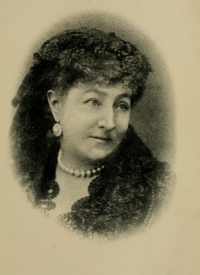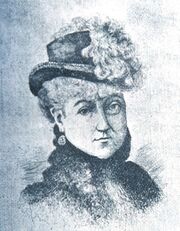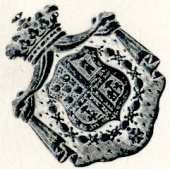Marie Sinclair, Countess of Caithness: Difference between revisions
No edit summary |
|||
| Line 5: | Line 5: | ||
Marie was born in 1830 as the daughter of General Jose de Mariategui. | Marie was born in 1830 as the daughter of General Jose de Mariategui. | ||
[[File:Marie Sinclair.jpeg|right| | [[File:Marie Sinclair.jpeg|right|180px|thumb|Marie Sinclair]] | ||
Early in life she married a Spanish General, the '''Count de Medina Pomar'''. She was named Duchess of Pomar in her own right by Pope Leo XIII in 1879.<ref>John Foster Kirk, "A Supplement to Allibone's Critical Dictionary of English Literature and British and American Authors, Volume II" (Philadelphia: J. B. Lippincott Co., 1899), 1349.</ref> They had a son, Emmanuel, the Duke de Medina Pomar, who became known for his writings about "spiritual philosophy."<ref>Dictionary of National Biography, cited in [http://id.loc.gov/authorities/names/n91035922.html Library of Congress] Name Authority File for Duke de Medina Pomar.</ref> After her husband's death in 1868, she inherited a considerable fortune. | Early in life she married a Spanish General, the '''Count de Medina Pomar'''. She was named Duchess of Pomar in her own right by Pope Leo XIII in 1879.<ref>John Foster Kirk, "A Supplement to Allibone's Critical Dictionary of English Literature and British and American Authors, Volume II" (Philadelphia: J. B. Lippincott Co., 1899), 1349.</ref> They had a son, Emmanuel, the Duke de Medina Pomar, who became known for his writings about "spiritual philosophy."<ref>Dictionary of National Biography, cited in [http://id.loc.gov/authorities/names/n91035922.html Library of Congress] Name Authority File for Duke de Medina Pomar.</ref> After her husband's death in 1868, she inherited a considerable fortune. | ||
Revision as of 18:19, 7 December 2023
Marie Sinclair, Countess of Caithness (1830 – 2 November 1895), formerly Marie (or Maria) de Mariategui, was a British aristocrat of Spanish descent who married, as his second wife, James Sinclair, 14th Earl of Caithness. She is particularly remembered for her interest in spiritualism and Theosophy and her association with Helena Petrovna Blavatsky, whose occult successor she claimed to be.
Personal life
Marie was born in 1830 as the daughter of General Jose de Mariategui.
Early in life she married a Spanish General, the Count de Medina Pomar. She was named Duchess of Pomar in her own right by Pope Leo XIII in 1879.[1] They had a son, Emmanuel, the Duke de Medina Pomar, who became known for his writings about "spiritual philosophy."[2] After her husband's death in 1868, she inherited a considerable fortune.
On 6 March 1872 she married a widower, James Sinclair (1821–1881), fourteenth Earl of Caithness and first Baron Barogill, in Edinburgh. He had been born in Edinburgh, Scotland on 16 December 1821. Before his union with Marie, he was married to Louisa Georgina Philips, with whom he had a son and a daughter. Sinclair was interested in science. He died in New York City on 28 March 1881, and was buried at the Abbey of Holyrood in Edinburgh.[3]
The Countess spent time in New York and London before settling in Paris at 124, Avenue de Wagram. She died there on 2 November 1896.
Theosophical Society involvement
Lady Caithness became active in the Theosophical Society in New York in 1876 shortly after it was formed, although her official date of joining was 1 February 1883, according to membership records at Adyar.[4] A wealthy dowager, she supported the Theosophical Society financially. She was crucial to the development of the Theosophical movement in France where she founded the Société Théosophique d'Orient et d'Occident on 28 June 1883 and served as its president. Among her writings was The Mystery of the Ages; Contained in the Secret Doctrine of All Religions, published in 1887. She corresponded with Vera Petrovna de Zhelihovsky and other Theosophists.
Writings
The Union Index of Theosophical Periodicals lists articles by or about the Countess or Caithness.
- Old Truths in a New Light, or, An earnest endeavor to reconcile material science with spiritual science and with Scripture. London: Chapman and Hall, 1876.
- Serious Letters to Serious Friends. London: Trubner & Co, 1877. Second edition available at Hathitrust, 341 pages.
- La théosophie universelle: théosophie Bouddhiste. Paris: Georges Carré, 1886.
- The Mystery of the Ages; Contained in the Secret Doctrine of All Religions, London, 1887. Fourth edition available at Hathitrust, 541 pages.
- A Midnight Visit to Holyrood. London: C.L.H. Wallace, 1887. Available at Google Books.
- Théosophie sémitique; Les vrais israélites: l'identification des dix tribus perdues avec la nation britannique; Les suffis et la théosophie mahométane. Paris: Libr. G. Carré, 1888.
- Je me suis éveillé: Conditions de la vie de l'autre côté, communiqué par écriture automatique. Paris: Rédaction et administration de l'"Aurore"', 1895. Accounts of life after death, communicated by automatic writing.
Additional resources
- "Marie Sinclair, Countess of Caithness" in Wikipedia.
- Caithness, Marie in Theosophy World.
Notes
- ↑ John Foster Kirk, "A Supplement to Allibone's Critical Dictionary of English Literature and British and American Authors, Volume II" (Philadelphia: J. B. Lippincott Co., 1899), 1349.
- ↑ Dictionary of National Biography, cited in Library of Congress Name Authority File for Duke de Medina Pomar.
- ↑ "Marie De Mariategin," Scotland, Select Marriages, 1561-1910.
- ↑ Theosophical Society General Membership Register, 1875-1942 at http://tsmembers.org/. See book 1, entry 1638 (website file: 1A/50).


